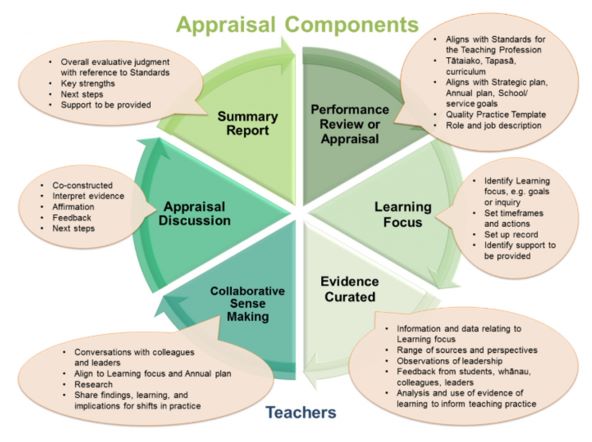Appraisal
Roles
The lead school/kura board ensures a robust performance appraisal model is in place for the cluster by:
- having a performance management policy
- making appropriate delegations
- monitoring policy implementation and procedures
- ensuring confidentiality
- specifying resolution processes.
The cluster manager is responsible for the appraisal of RTLB and may delegate this responsibility to a practice leader. The cluster manager, in consultation with RTLB, establishes the timeframe for the annual appraisal cycle.
The principal is responsible for the appraisal of the cluster manager.
Appraisal process
RTLB appraisal and development is a dynamic and continuous process.
Performance appraisals occur every year as part of performance management. The performance appraisal process provides a balance between accountability and development. It provides an opportunity for the appraiser to provide constructive feedback and support on performance and development.
RTLB are appraised against the Standards for the Teaching Profession. This replaces the Practising Teacher Criteria from 1 January 2018.
Appraisals:
- take place within a structured, monitored and continuous process and in a supportive environment
- are evidence-based
- are linked to, and ensure, relevant professional learning aligned to the cluster’s strategic plan and linked to each RTLB development plan
- include a record of the issues raised and the decisions reached
- include self-appraisal as an integral part of the process
- use the Standards for the Teaching Profession and the Professional Standards where there is a collective agreement in place.
- are aligned with the cultural competencies for teachers of Māori learners in Tātaiako
- promote cultural competencies for teachers of Pacific learners as outlined in Tapasā.
- identify resources needed to support agreed goals
- support both individual and cluster performance
- align individual goals and objectives with the cluster’s vision
- address individual RTLB and cluster development.
Through the performance appraisal process RTLB:
- highlight their own strengths
- provide evidence of their new learning
- identify areas for growth and ongoing professional learning
- build capability aligned to cluster strategic plans
- engage and consider the practice principles of He Pikorua.
If an RTLB is identified as not meeting the expected performance requirements, the lead school, kura board must first address the matter through its normal employment policies and the practitioner’s performance requirements identified in the relevant employment agreement.
New Zealand School Trustees Association
Provides a range of services to all boards of trustees
These support and enhance boards’ capability in governance and employment.
Conduct concerns
The Council manages concerns about teachers breaching the Code of Professional Responsibility.
Employers can find information about reporting, assessing, and investigating a concern.

 Tātaiako
Tātaiako

Tātaiako: cultural competencies for teachers of Māori learners
A resource to support teachers to develop cultural competence to successfully teach Māori learners.
Tātaiako is a guide for teachers, employers, Initial Teacher Education providers, and those delivering teacher professional learning. It helps them think about what successfully teaching Māori learners requires and includes a framework that highlights five essential competencies needed when engaging Māori learners.
You can download a PDF of the full document.
Tapasā


An introduction to Tapasā
The Tapasā framework will help teachers to contextualise quality teaching and learning by providing a Pacific lens to the Standards for the Teaching Profession.
Teachers interpret and refine their own understandings of what each of the Standards look like in their setting. For many teachers in Aotearoa New Zealand, Tapasā will be a key resource for thinking about teachers’ practice and quality learning for Pacific teachers.
The link takes you to a page (TKI's Pasifika Education Community) where you can download a PDF of the full document.
Evidence of effectiveness
RTLB work supports teachers, kaiako to more effectively manage and teach learners in their classrooms. RTLB case records contain evidence of improved outcomes. Evaluative feedback can provide supporting data.